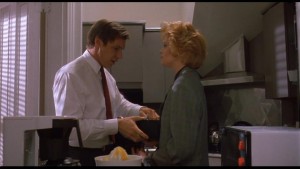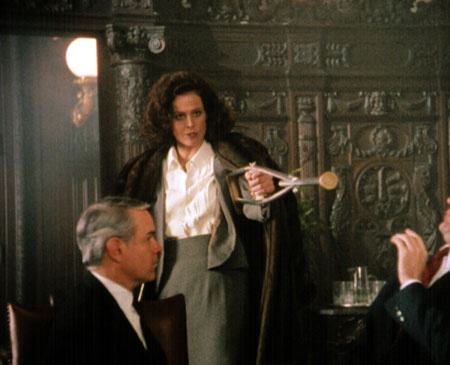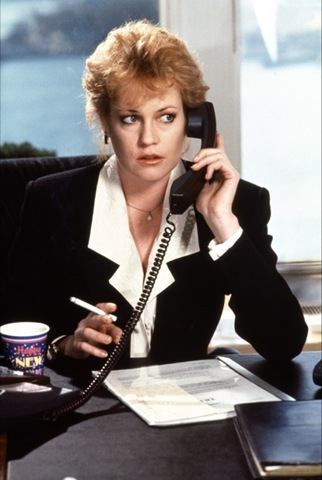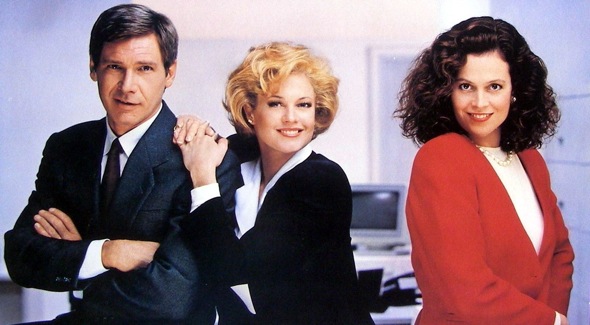[Enjoy this guest post from frequent contributor Meghan O’Keefe! – Ed.]
If you Google Working Girl, you’ll discover that it’s described as a “romantic comedy” and “an inspiring tale”. If you watch it, you’ll probably think of Tess McGill’s story as “feel good”. If you spend a weekend, like I did, thinking critically about why Katherine Parker is painted as a venomous villainess and why Kevin Spacey and Oliver Platt’s characters get away with pressuring women into prostitution, then you start to look at the film as a disturbing glimpse into the double standard that permeates business culture.
The lesson of the film isn’t that women can succeed in a man’s world by working together; the lesson is that women have to destroy each other to ensure only middling success.
Tess McGill (Melanie Griffith) is the heroine of Working Girl and Katherine Parker (Sigourney Weaver) is clearly painted as the villain, but upon further inspection the morality of both characters and their actions falls under suspicion. Katherine steals one good idea from Tess, but Tess steals Katherine’s entire life. She moves into Katherine’s home and into her office at work. Tess goes through Katherine’s home office, medicine cabinet and closet, taking whatever she likes. Tess even steals Katherine’s lover. Granted, Jack Trainer is a grown man who can choose whom he loves for himself. However, it should be noted that Katherine stole one idea from Tess’s brain and Tess stole Katherine’s entire identity. Katherine certainly deserved some kind of comeuppance. Plagiarism is most definitely both a legal and moral offense, but Tess’s revenge goes beyond even an eye for an eye. It’s an entire body for an eye.
It is fun to watch Katherine get her comeuppance, but Katherine is the only character in the entire movie who actually gets any payback. The men in Working Girl get away with complete moral bankruptcy. In fact, they are typically rewarded for their terrible behavior. Kevin Spacey snorts cocaine and sexually harasses Tess, but he gets to keep his job. Oliver Platt pimps Tess out and only suffers the fleeting shame of being a mid-day punchline. Even Tess’s horrible boyfriend, as played by Alec Baldwin with his trademark smarm, gets rewarded for being an asshole. She walks in on him cheating on her and by the end of the movie, they’ve become friends They both are advancing in their careers and Baldwin’s character gets to date the woman he cheated on Tess with. Finally Harrison Ford’s Jack Trainer gets to be a sleazebag and the romantic hero.

When we first meet Jack Trainer, we believe that he is going to date rape Tess. The fact that he doesn’t—that he takes her home with him, undresses her and lets her sleep in his bed—is supposed to be proof of his moral compunction. This is after he liquors her up, refuses to tell her his name and pretty much makes it clear that his only interest in her is physical. It’s supposed to be a compliment when he says, “You’re the first woman I’ve seen in one of these damn things that dresses like a woman, not like a woman thinks a man would dress if he was a woman.”
There is definitely something to be said for the fact that much of Katherine and Tess’s individual power comes from their ability to be a woman. Both use sex(uality) to finesse their way into meetings and alliances. Jack’s comments and both Katherine and Tess’s behavior illustrates that women are not equals in the business world. If they were, they could be seen not as sexual objects, but intellects.
Even the title of the film is rife with tension. Maybe it wasn’t as controversial in the 1980’s, but nowadays the use of the word “girl” to describe a grown woman is a huge source of contention. Is the word “girl” truly demeaning, or is it threatening? There’s a moment when Katherine and Tess meet where an unspoken power battle takes place over the issue of their ages. The much more successful, sophisticated and urbane Katherine is slightly younger than Tess. Tess sheepishly (and Melanie Griffith did deserve an Academy Award nomination for the wide spectrum of conflicting emotions Tess’s face reveals in this scene) admits that she has never worked for anyone younger before, nor for anyone female. “Is that going to be a problem?” Katherine asks as she only half suppresses a grin. Tess’s answer is no, but it winds up being a huge problem.
Why? Because youth in a woman often equals desirability which in turn equals power.

Note how ogrish she looks in this shot: rings under her eyes, hulking shoulders (due to the coat) and a threatening metal claw.
It’s kind of terrifying to consider the fact that there are probably many women in business today who grew up inspired by Working Girl. It’s the All About Eve of the business world. However, All About Eve delivers a far more unflinching look at the issues that women face when pursuing power. It’s clear at the end of All About Eve that Eve Harrington is going to be overthrown by Daphne and that the rest of the cast of characters finally sees Eve’s machinations for what they are. The ending of Working Girl is far more confusing. Do Jack and Trask see Tess as someone who is just as conniving as Katherine (or any man in the industry)? Is Katherine supposed to get any kind of sympathy from the audience? Is Tess even aware that she’s setting herself up to be ruined by her assistant?
When we first meet Tess’s assistant, she has brazenly taken over Tess’s office, using it for her own personal phone calls. There’s also a bit of attitude when she asks, “What do you expect from me?” Tess tries to finally be the better person—or boss, in this case. She says they are equals (which they most certainly are not in the professional sense of the word) and that Tess pretty much won’t be expecting much from her new assistant. Tess is essentially setting herself up to be pushed aside by her own assistant, the same way Katherine was by her. The cycle is going to continue.

In Working Girl, women are pitted against other women, but that’s not the biggest tragedy. The tragedy is that the men are still exploiting the women mentally, emotionally and sexually without recourse. Katherine, Tess and the other female characters (including an HR director played by Olympia Dukakis) seem to accept that they can never change the fact that men can do anything in the world of Working Girl and get away with it, because for men there are no rules. As Katherine smoothly tells Tess, “Never burn bridges. Today’s junior prick, tomorrow’s senior partner!” The reason that the men can get away with all of their misdeeds is because the men never blow the whistle on each other. The only people who get in trouble are women. The reason for that is unlike men, the women don’t support each other. Working Girl not only illustrates this practice, but presents it as a success story.
What makes Working Girl such a compelling piece of anti-feminist propaganda is its witty writing, brilliant performances and unflinching realism. It’s not farcical like the earlier feminist revenge comedy, Nine to Five, nor is it fantastical like later feminist empowerment flick Legally Blonde. Tess seems more like a real woman because she is more realistic than Dolly Parton’s Doralee Rhodes or Reese Witherspoon’s Elle Woods. She wears sneakers on the street and sweats when she has to push around dim sum. I’m not going to lie: it is a good movie. I liked it. Which is the problem. Women shouldn’t watch a film about how they can’t ever beat the system and think it was “fun”. It should be terrifying.
Ultimately, the message of Working Girl isn’t that with hard work you can beat the odds. The message of Working Girl is that women can advance in a man’s world if they throw other women under the bus.
[What say you, Overthinkers? Does Working Girl’s cat-eat-cat message ruin the fun? Or can you still enjoy a movie even if it’s a little bit regressive? Sound off in the comments!]

Meghan O’Keefe is a stand-up comic and writer living in New York. When she’s not guesting for Overthinking It, she writes for HelloGiggles, The Hairpin, Splitsider and The Apiary.
First off, look at Carly Simon’s hair! I was in 1988 instantly.
I loved the movie, more because of Melanie Griffith’s performance then the message or the story. It was a sign of the times movie, something, even as a man, I could relate to. There was very little suspension of disbelief for me that a “girl” from the “wrong side of the river” would be in over her head in big business in the male-dominated world. High concept. Easy popcorn eating movie.
Can I watch a high concept, easy popcorn eating movie that happens to be regressive AND overthinkit? Of course, but not at the same time.
You use 9 to 5 as an example. Dolly needed to get someone out of the way so they sent Miss Hart (Marrion Mercer) away to language school. They needed Katherine to step out so that Tess could step in. Katherine breaks her leg skiing in Europe. That part always seemed so forced. It was as if it was backed into. “OK, we need Katherine to be stunted in some way so her physical presence is not as dominating and we need her sequestered so we can have Tess stay in her house and office and steal her man. So what would a rich businesswoman do that could get her in that situation.” I can roll with the high concept only so much.
Ultimately, they use the Southern gentleman (Owen Trask) who can see honest and sincere as opposed the slickster making a deal. Yet, Tess had made her character transformation to backstabber. Is this just a rise to power narrative sold as romantic comedy set in the woman’s working world in the 80’s? A feel good Wall Street (1987) with hair spray instead of hair gel?
I watched Working Girl recently, and a lot of what you say is dead-on — the goal of the movie is not at all to advocate for progressive attitudes in the workplace, especially the idea that women in the workplace have some sort of common interest.
The goal of the movie is to get you to sympathize with this one female character who is trying to make it in a dog-eat-dog world, where everybody acts in self-interest, and the overall environment is basically amoral. It is her story, cast as a comedic psychological drama. How does she deal with this crazy world around her?
Part of what is shocking about the movie is how much other women in the workplace turn out to not have your best interest at heart nearly as much as you would hope or expect them to. If this is true (and especially if it was true when the movie was made), is pointing it out antifeminist? Does every movie have a responsibility to be aspirational in how it portrays social organization?
Or are we allowed to point out that this is pretty sucky and difficult to get through? At what point are we damned for insufficient zeal for the revolution?
As I’ve mentioned in comment threads before on this site to much controvesy, I don’t think you can condemn a work of art politically without considering its outcomes. Gender and racial politics don’t exist independently of experience, because gender and race are social constructions that depend on context.
So, is the net political outcome from making and watching Working Girl detrimental to the interests of feminists to such a broad degree that it qualifies as antifeminist? And does it reflect the necessary intentionality and reductiveness to qualify as propaganda?
I would argue not. I don’t think the world as portrayed in Working Girl is normative — that people who watch the movie leave it with the impression that this is how they want their workplace to function.
I think they leave it with sympathy for Tess, with inspiration and excitement to try to make it professionally whereas previously they may not have been interested. This is primarily informed by intuition and discussions about the movie with people from my mom’s generation (including my mom).
A similar piece would be The Cherry Orchard. The world of The Cherry Orchard is cruel-with-jokes, and the play doesn’t make a great case for upending the economic order that is tearing the family apart. The characters who think they can actually do something meaningful about the situation are generally buffoons – but I think you primarily leave the play with sympathy for the family, not a deepened impression of the rightness of the social order – or even really a deeper resignation to it.
So while I would definitely say Working Girl declines to present a bold new social paradigm to redefine discourse (drink) around women in the workplace, I don’t think its actual outcome is antifeminist, I don’t think it was made to be antifeminist, and I don’t think calling it “antifeminist propaganda” is fair.
Now, if they made it _today_, and they didn’t change it much, well, _then_ it would almost certainly be antifeminist propaganda, because there would no longer be a justifiable drive to naturalism, and because the discourse (drink) has changed enough that its variation from contemporary norms would be conspicuous enough to indicate intentionality.
I’m nitpicking though. Definitely a good article.
This is interesting stuff! I think the final scene, when Tess meets her new assistant, is an interesting one to unpack. You’re supposed to feel good about it, because Tess is going to end the cycle of abuse and treat her assistant as a human being and not a servant. And the implicit argument is that the assistant will appreciate this and be a better assistant. But you raise a different possibility: that Tess will be SO nice to her assistant that she won’t be an effective boss. Tess does not want to become what she hates. But maybe the people she worked for were pricks because prickish behavior is actually somewhat effective in the workplace.
Very good dissection of an interesting topic. I feel there are a number of films that on deeper analysis, seem to negate their own premise in a similar way. (I apologize for the lack of supporting examples)
I wanted to bring up one semantic point I don’t think you noted in the article. You mentioned the the movie title’s use of the word ‘girl’ and the demeaning connotation it implied. I think the other important connotation of the full title ‘working girl’ is that of a prostitute. This seems to fit well with the depiction of the male dominated work environment and the need for the heroine to rely on sex and sexuality to secure support for her coup. If I remember correctly (it been a while), it is only by the good graces of Jack Trainer’s support, gained by way of a romantic relationship that our ‘Working Girl’ is able to withstand Kathrine’s at least partially justified attacks.
Thoughts?
Did anyone else think of this when they saw that second picture, the one of “ogrish” Sigourney Weaver?
Okay, two Sigourney Weaver/Aliens related comments in two days. I swear I’m not obsessed or anything…
The sad thing is this theme of Woman vs. Woman in the work place is alive and well. You could say many of the same things about this year’s French psychological drama Love Crime.
Also note the closing shot of the film – Tess has achieved her dream of an office (and PA) of her own. She is supposedly fulfilled. Then the camera pans out of the office and we see her window, then all the other tiny windows of the skyscraper as Carly Simon plays and the credits roll. In other words, Tess has machinated her way to the top but she is still just one little square window in a sea of windows, still a wage-slave cog in the capitalist machine etc etc etc….
I have never seen Working Girl but I think the focus on female competition in this article is a good one to choose. I almost get the sense of competing narratives. The Sigourney Weaver character could have easily been the protagonist of a different film. Katharine is young, ambitious, and adept at manipulation. Without seeing anyone older and more deserving, like the Bette Davis character in All About Eve, we would assume the Eve character is plenty deserving, and cheer her on for rising to a high position at a young age, presumably because of merit and effort.
Then, there is the alternate transformation story. Why does Tess get absorbed into the system such that it seems like the pattern is going to repeat itself? Once her secret is out, why doesn’t she go back to her old look? The trailer presents the conflict as stemming from the fact that Tess is a “local girl” and didn’t get a prestigious education (wikipedia). Shouldn’t she end by abandoning her transformation if her merit isn’t defined by her background and appearance?
I may be completely wrong about all of this having never seen the movie but I accept that.
I’ve never seen *The Devil Wears Prada,* but what I remember from the trailers seems to indicate that it may have had similar plot points. It would be interesting to compare the two in terms of the intraoffice dynamics of women…